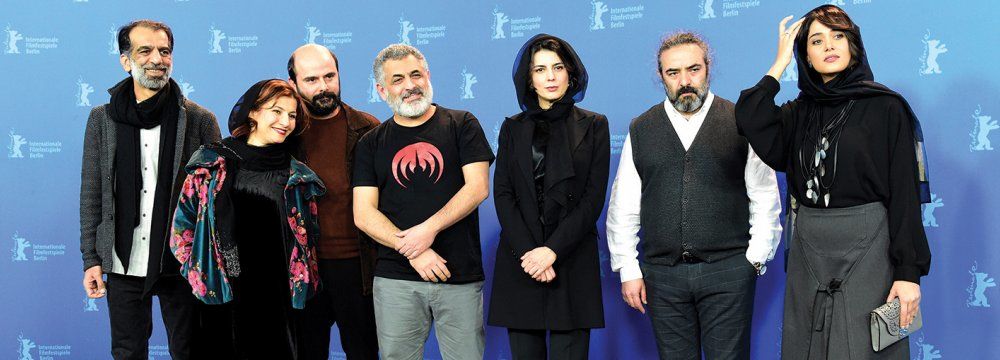Haghighi Perturbed by Endless Political Queries

TEHRAN –(Iranart)- M ani Haghighi’s ‘Pig’ had its world premiere on February 21 at the 68th Berlin International Film Festival, Berlinale (February 15-25). The event was followed by a press conference in the presence of the director and film cast, where Haghighi was disconcerted at the reporters’ questions that dealt largely with issues unrelated to his film and focusing on the political atmosphere in Iran affecting his filmmaking.
“Every interview I do, it’s about ‘so what do reformers think of you?’, ‘What do the hardliners think about you? ‘Have or have you not been censored?’, ‘How do you deal with censorship?’, fine!
How many times do we need to hear this? Yes, there is censorship in Iran. Yes, it’s difficult to live with it and yes we are dealing with it. But there is so much more to discuss”.
He then asked the audience, “why do you think Iranian films are supposed to be some kind of a tour guide of Iran for you?”
With a smirk on his face, Haghighi continued, “you know, we are not here to present our country and tell you ‘come, look how victimized we are, come and help us,’ and all that stuff. It’s sickening and tiring, it’s tiresome. I encourage you to think of this film as a film, as a piece of art and talk about how we made it because it’s interesting”.
The director said the screening permit for his film has been issued by the Ministry of Culture and Islamic Guidance and will open in Iranian cinemas next month.
Written, directed and produced by Haghighi, Pig, a black comedy, is Iran’s sole entry in the main competition lineup of Berlinale and competes with 18 other films for the Golden Bear, to be awarded on Feb. 24.
Among the cast, Leila Hatami, Hassan Majouni, Parinaz Izadyar, Leili Rashidi, Ali Mosaffa and Ali Bagheri attended the festival.
The film is about Hassan Kasmai, a filmmaker (played by Majouni), who starts to panic after being blacklisted and losing the actress (Hatami) he made a star who now wants to make a film with a rival director. Hassan is further eaten up with jealousy when a serial killer targeting famous filmmakers in Tehran ignores him.
Poles Apart
While the stereotypical image of Iranian cinema has been usually represented by the dramas of Oscar-winner director Asghar Farhadi and the art films of the late auteur Abbas Kiarostami, the movies of Haghighi are poles apart.
“Iranian films were supposed to be simple, humanist tales of innocence with minimalist story structures, non-professional actors and realist narratives,” the director pointed out at the press conference, referring to the influence of Kiarostami. “I’m still in love with many of those films. But I also feel suffocated by the pressure of their legacy on Iranian filmmakers.”
Haghighi’s atypical works have made him a Berlinale regular, with four of his films having been shown at the festival including ‘Men at Work’ (2006) and ‘Modest Reception’ (2012) in the Forum section, and the ‘A Dragon Arrives!’ at the Competition section in 2016, DW reported.
After watching Pig, several famous film critics wrote positive reviews on it.
Jessica Kiang of Variety wrote, “experimental Iranian mischief-maker Mani Haghighi delivers a fizzy meta-comedy that goes just a little flat in the end”.
“Pig, named for the word the killer carves into the foreheads of his victims, is a profoundly unserious examination of the directorial personality, packed with dream sequences, strobe lighting, costume parties, and overly aggressive games of tennis. And modern social media culture does also come in for a (rather tired) drubbing: Hassan’s petty delusions of grandeur are of course validated and exacerbated by Instagram likes and YouTube video views,” she added.
Deborah Young of Hollywood Reporter also pointed to “the power of social media to destroy a person’s reputation” as a dominant theme in the film.
“Pig is certainly more straightforward, less perplexing and exotic than Haghighi’s A Dragon Arrives! Here, cinematographer Mahmoud Kalari switches to the gaudy, unreal colors of stage costumes and the overblown, Felliniesque interiors designed by Amir Hossein Ghodsi. Peyman Yazdanian’s score keeps pace with the film’s mood, culminating in Hasan’s heavy metal fantasy,” she continued.
Demetrios Matheou of Screen Daily called the film a “bold and challenging concoction” and wrote, “there’s much to enjoy in this social satire with flamboyant direction, a frequently funny script and a vivid central performance.”

